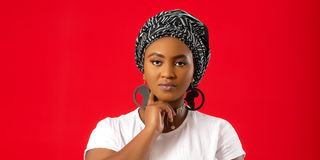The drying up of our village rivers was my wakeup call toward climate change advocacy

Abigael Kiprono Kima, 24, is a young energy expert and climate activist. She is the producer and host of Hali-Hewa podcast (Hali-Hewa is a Swahili term for ‘climate’), profiling African activists and climate experts.. Photo | Pool
What you need to know:
Abigael Kima, 24, is an energy expert and climate activist. She is the producer and host of Hali Hewa Podcast profiling climate experts and African activists
Abigael Kima is acutely aware that, on matters of climate change, things are not looking great. She has read the dire climate reports, and sat on meetings where questions on how to confront climate change crises were being fronted in all forms, and worse, she has experienced it.
Growing up in Iten, Elgeyo- Marakwet County, she fondly remembers a stream that cut across their farm and the many trees that surrounded not only their home but also her neighbourhoods. Although both of her parents were in employment, the income supplement from the sale of farm produce was a huge blessing. “We led a comfortable life as my siblings and I were well catered for,” she said.
Change
When she joined secondary school, she left her hometown, and upon her return in 2015, she saw first-hand the hazards that climate change had unleashed. The stream that gave their farm a lifeline was no longer there, harvests were grim and most farmers, in search of arable land had encroached on the forests, resulting in deforestation.
“Even though I didn’t know much about climate change then and I was still an adolescent, I knew that something needed to be done to avert the impact. At was that point that I decided to pursue a career path in environmental conservation,” said the 24-year-old.
Abigael takes to podcasting to communicate on climate change crisis and engage with climate change experts on themes including energy transition, loss and damage, and youth participation in intergovernmental processes. Launched two months ago, (she has been working behind the scenes since November last year), the Hali Hewa podcast will air through COP27, which will take place in Egypt later in the year.
“When I attended the past UN Climate Change Conference in Glasglow, it occurred to me that there was so much I didn’t know about climate doomism, adaptation, and solutions. This was against the backdrop of having pursued environmental science at Kenyatta University and leading the institution’s environmental club for three years. I wondered, “If I am this lost, what about other young people who are on different career paths or don’t get opportunities to sit at tables where matters of climate change are being discussed,” she said. She started the conversations on Instagram, posting daily titbits from the conference to her followers.
Through the Hali Hewa podcast, she says that her goal is to amplify African stories on climate change. “We focus so much on numbers and complex terms but at the end of the day, we need to put a face to these issues. You know, bringing the communities at the forefront of the crisis,”
Why it matters
As Africa prepares to host COP27, the Eco-Hero Award winner believes that her audio storytelling is critical for this moment. “Many communities across the country are feeling the effects of climate change crisis and we are in a season where most households are rushing to buy home heaters because of the intense cold,” she said.
Young people at the forefront
The environmental conservationist is part of a growing cadre of young people who are using different platforms to start narratives on solutions to climate change and creating awareness around the issue.
“Many young people like me are tired of hearing how bad things are and what will happen in the future. We have realised that we are dependent on the stability of our climate. Our future is at risk and we have to rise up and fight for it,” she said.
The production of the podcast has not been smooth sailing. The hardest part of the journey, she said, was getting sponsors for the eight episodes of the series.
“I knocked on many doors but most potential sponsors wanted to see my numbers on social media. For a long time, I have been working behind the scenes but never putting my work out there. I didn’t have the numbers as I was not active on social media. To start, I had to dig into my savings but along the way, I got a partner,” she said.
When she interacts with members of her community or gets an opportunity to speak at conferences, she emphasises individuals taking personal responsibility for climate change action. “It is the day-to-day decisions that matter. Like reducing carbon emissions by cycling to work, reducing water waste, and investing in energy-efficient appliances,” she says.
Abigael, who is the Africa Youth Lead for the Marine Arctic Peace Sanctuary under the Parvati Foundation that advocates for the protection of Arctic Sea Ice is also engaged in mentoring young people through the Green Generation Initiative and the Jubal Band in her hometown Iten.





